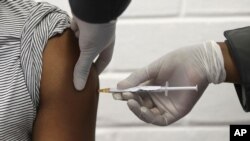British drug maker AstraZeneca is cooperating with government regulators in investigating a manufacturing error of an experimental COVID-19 vaccine.
The pharmaceutical company and Oxford University have admitted that a lower dosage of the vaccine performed better than a full dosage, according to a spokesman who spoke after AstraZeneca's CEO said a further global trial was likely.
The statement comes as the company prepared to provide a temporary supply of the drug ahead of its plans to distribute 4 million doses of the vaccine by the year's end.
Meanwhile, Australia's second-largest state, Victoria, has recorded no new coronavirus infections or deaths in the past 28 days, health officials said Friday.
The state did not have any active cases after the last COVID-19 patient was discharged from the hospital Monday.
While Victoria has achieved the 28-day benchmark, widely accepted by health experts as eliminating the virus from the community, cases of the coronavirus infections have been detected in other parts of the country.
In Latin America, Brazilian President Jair Bolsonaro said Thursday he would refuse a coronavirus vaccine, the most recent of his vaccine-skeptic statements.
"I'm telling you, I'm not going to take it. It's my right," he said in remarks aired over several social media platforms.
Brazil, with more than 6 million cases of COVID-19, is second only to the United States and India, and at more than 170,000 deaths, it is behind only the U.S., according to the Johns Hopkins Coronavirus Research Center.
Just as Bolsonaro played down the seriousness of the pandemic, he has also expressed skepticism of mask wearing. In addition, Thursday he said it was not likely that Congress would make a coronavirus vaccine mandatory.
The United States added more than 181,000 cases Thursday and registered nearly 2,300 deaths from the coronavirus. Nearly 90,500 people were hospitalized Thursday, amid worries that Thanksgiving gatherings with family and friends will lead to even more infections and hospitalizations.
Officials in many states have put restrictions in place to slow the spread of the virus. However, the U.S. Supreme Court issued a temporary order blocking New York state from enforcing attendance limits at houses of worship in areas that have infection spikes.
In a 5-4 vote, the court sided with the Roman Catholic Diocese of Brooklyn and two Orthodox Jewish congregations that challenged the system put in place by Governor Andrew Cuomo.
The majority opinion pointed to limits of 10 or 25 people in houses of worship, while under the same designation grocery stores and other essential businesses can operate without capacity restrictions.
Chief Justice John Roberts, the only conservative justice who did not join the majority, said in his dissent that "it is a significant matter to override determinations made by public health officials concerning what is necessary for public safety in the midst of a deadly pandemic."





